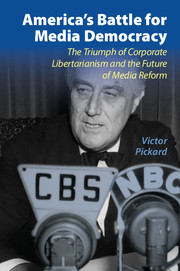 America's Battle for Media Democracy
America's Battle for Media Democracy Book contents
- Frontmatter
- Contents
- Acknowledgments
- Introduction
- 1 The Revolt against Radio
- 2 A Progressive Turn at the FCC
- 3 The Battle of the Blue Book
- 4 The Origins of the Fairness Doctrine
- 5 The 1940s Newspaper Crisis and the Birth of the Hutchins Commission
- 6 Should the Giants Be Slain or Persuaded to Be Good?
- 7 The Postwar Settlement for American Media
- Conclusion
- Bibliography of Primary Sources
- Index
- References
2 - A Progressive Turn at the FCC
Published online by Cambridge University Press: 05 October 2014
- Frontmatter
- Contents
- Acknowledgments
- Introduction
- 1 The Revolt against Radio
- 2 A Progressive Turn at the FCC
- 3 The Battle of the Blue Book
- 4 The Origins of the Fairness Doctrine
- 5 The 1940s Newspaper Crisis and the Birth of the Hutchins Commission
- 6 Should the Giants Be Slain or Persuaded to Be Good?
- 7 The Postwar Settlement for American Media
- Conclusion
- Bibliography of Primary Sources
- Index
- References
Summary
Despite its New Deal origins, the Federal Communications Commission (FCC) did not begin with a reformist agenda. The commission’s early years saw few policy challenges to American radio’s increasing commercialization. The inveterate media reformer Everett Parker, recalling how the FCC’s genesis was characterized by close ties to media corporations, quipped that prior to its formation, “four commissioners were vetted by AT&T and three by broadcasters.” Given such proclivities, the FCC would not seem to be a natural progressive ally. Although the 1934 Communications Act – the FCC’s founding charter and the blueprint for its regulatory power – gave it a mandate to serve the always-contested “public interest, convenience and necessity,” the commission was largely nonconfrontational in its interactions with commercial broadcasters. Indeed, what is known as “regulatory capture” – when federal agencies seemingly act in concert with the industries they purportedly regulate – gives a fairly accurate picture of how the FCC typically operates, then and now. However, under new leadership in the early 1940s, the FCC changed its behavior markedly. It confronted media corporations and aggressively defended public interest principles while facing considerable political opposition.
Few would have predicted such a turn. The FCC was preceded by the Federal Radio Commission (FRC), a temporary agency founded in 1927 to provide regulatory stability, particularly around technical issues, for the increasingly contested airwaves. Congress soon deemed the FRC inadequate to keep up with expanding communication technologies, and regulation of all interstate communications was consolidated under the new agency of the FCC, giving it authority over telephony and broadcast media. While its purview did not include potentially contentious duties like overseeing industry profits or rate structures, the FCC nonetheless faced several regulatory quandaries. As with the FRC, the FCC was tasked with granting licenses, inspecting equipment, and ensuring that broadcasting stations served a public interest mission. However, programming regulation was a thorny terrain because the FCC was forbidden by law to practice censorship as described in the Communications Act. Moreover, the standards by which licensees were judged remained ill defined, thereby inviting charges of arbitrariness. Thus any FCC attempt to establish public interest standards invited conflict with the commercial broadcast industry, including accusations of paternalism and infringement of free speech. These power struggles often hinged on the question of government’s role in media regulation and disagreements over First Amendment interpretations.
- Type
- Chapter
- Information
- America's Battle for Media DemocracyThe Triumph of Corporate Libertarianism and the Future of Media Reform, pp. 38 - 61Publisher: Cambridge University PressPrint publication year: 2014


